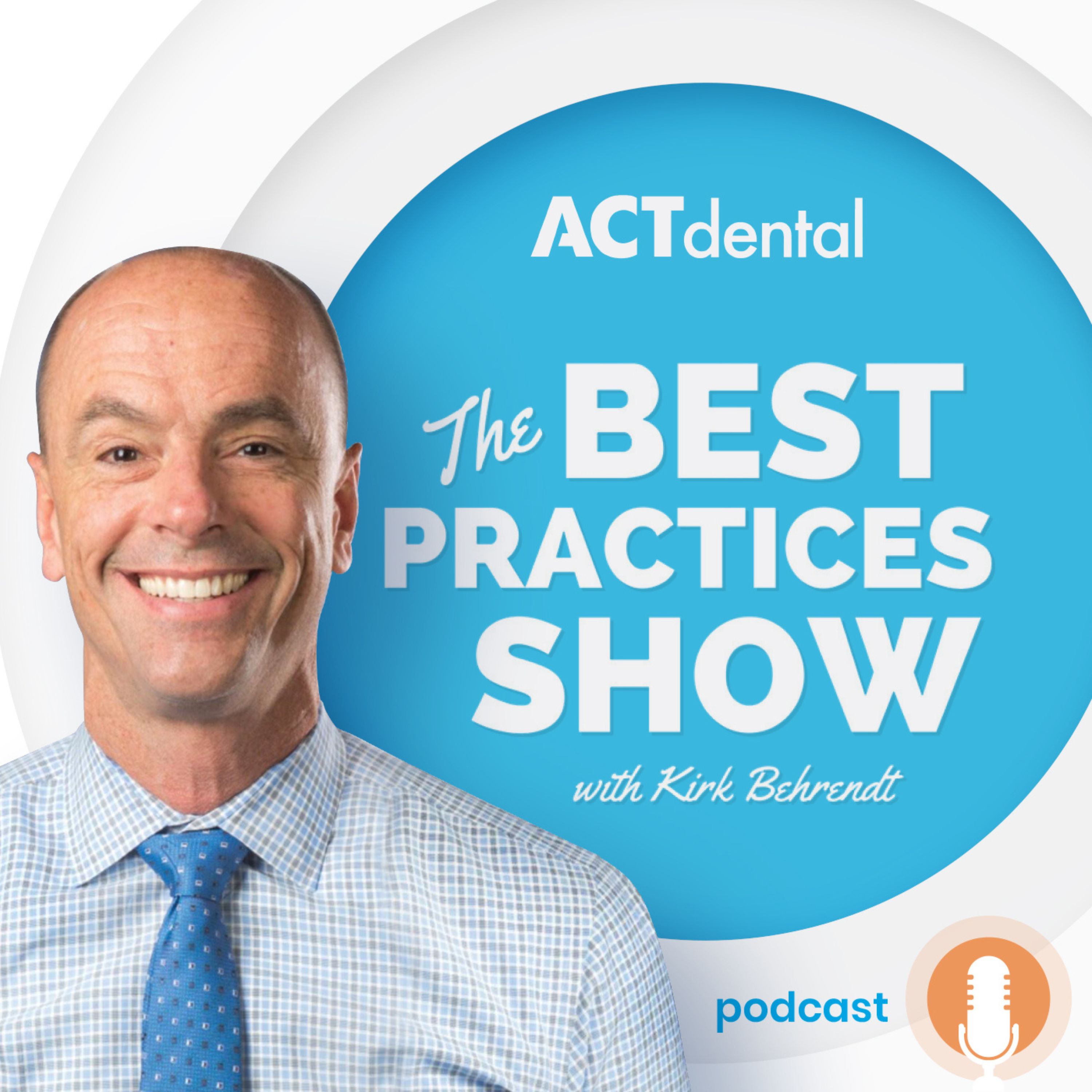Episode 356
356: Mastering Verbal Skills – Part 2 - Jenni Poulos
Mastering Verbal Skills – Part 2
Episode #356 with Jenni Poulos
In part one of Mastering Verbal Skills, Kirk Behrendt and Jenni Poulos discussed how words carry weight and why language matters in your practice. In today’s lesson, Jenni explains why listening also matters and how critical it is for mastering verbal skills. With the templates they provide, you can learn how to listen to and answer some of the most difficult questions patients ask! For more on active listening and communication, listen to Episode 356 of The Best Practices Show!
Main Takeaways:
Listening is also a crucial part of verbal skills.
Improving verbal skills will open up possibilities.
Language helps differentiate and communicate your practice’s strengths.
You can communicate value to your patients using appropriate language.
Use the “feel, felt, found” concept to discuss difficult patient questions.
Quotes:
“What we say matters. How we say it matters. How we lean in, and how we’re curious, and how we listen matters. And listening is as big a part of verbal skills as is speaking. It affects our relationships with our team members. It affects our relationships with our patients, our case closure, the predictability of our days, our lives. So, it’s super important.” (1:49—2:18)
“[A typical comment from patients is], ‘I'm only going to do it if it’s covered.’ And we have to move patients past this limiting belief that their insurance exists to provide them with optimal health, because we believe that, ‘If my insurance says that I can't have it paid for, then I don't need it,’ and that could not be farther from the truth.” (3:55—4:18)
“Our understanding of insurance is completely rooted in the way that medical insurance functions. Medical insurance and dental insurance do not function in the same way at all. So, we want to differentiate by changing the language. We don't want to call it “insurance” because it doesn't function how you understand insurance. It’s not a full-loss item. It’s a benefit that will assist, but it’s not going to cover everything. It was never intended to, nor will it, ever.” (5:11—5:48)
“People are advocating to use their benefits because they have them. I don't want you to look at their benefits as the enemy, just how do we communicate the way that we do it in our office, the way that we utilize benefits, in order to move patients through to acceptance.” (6:33—6:51)
“Write this down. It’s a great phrase and it will help you with this question. ‘What I want you to understand, Mrs. Jones, is that your benefits exist to help you maintain, but not to obtain, oral health.’ That's a great way to think about them.” (7:02—7:21)
“People pay for the things that they value. We will invest in what we value. I like to joke about this, but I say this with my team, ‘Oh, your Coach bag goes so great with your Class IV perio disease.’ I have invested thousands of dollars in a purse. If I value my health, I probably will invest an equal amount in that. So, it’s important that we’re able to convey value and help patients see value and lead them to the value that is there. And if you can believe it and confidently communicate it, the patients will have an easier time seeing it.” (11:14—11:56)
“People may not know this, but [insurance companies] actually can come back and say — up to a year later — ‘Hey, we overpaid, and we need some money back.’ You may preauthorize, get payment, and be told in eight months, ‘I need money back.’ So, there is never a guarantee of payment from the dental insurance companies. Never tell your patients that there is a guaranteed payment. It is always only an estimate. Even after the check has cleared the bank, it is still not a guarantee.” (12:05—12:39)
“Unless your patient, and there are instances in which they are part of an exclusive provider organization where they must see an in-network provider to get any level of benefit — and those types of plans do exist — for the most part, they are able to choose and see an unrestricted provider and still get some coverage. So, this is a fallacy that we need to be able to move patients through and, ‘We’re not in-network because you, my dear patient, are more important than our relationship with a dental benefits company.’” (14:17—14:55)
“Feel, felt, found. I love the feel, felt, found concept. People don't want to feel that they're alone, or that they’ve gone first, or that there’s some unknown. It’s the herd mentality. So, if you can say, ‘I understand how you feel. Others have felt this way too, and they’ve found that it’s okay.’” (18:08—18:40)
“One of the most important things that you can do as a doctor, as a team, to prepare yourself to answer this question, [‘Why don't you accept my insurance plan?’] is to think about your core values and what your core values tell you about how you want to treat patients. Because I guarantee you that's going to give you the most authentic answer that you can provide.” (23:31—23:51)
Snippets:
0:00 Introduction.
1:29 Language matters.
2:39 Dealing with patient obstacles.
4:22 Why it’s important to change your language.
6:17 “Can you find out what my insurance company will pay?”
8:07 Use language to communicate value to patients.
13:50 “Why aren't you in my network?”
14:59 Other things to point out to patients.
17:46 Feel, felt, found.
19:47 Spend time telling patients what you do, not what you don't do.
21:44 “Why don't you accept my insurance plan?”
24:30 Other obstacles from patients.
27:50 Establish a relationship with patients.
32:11 How to answer other patient questions.
33:56 Conclusion.
Reach Out to Kirk and Jenni:
Kirk’s email: kirk@actdental.com
Jenni’s email: jenni@actdental.com
Jenni’s Facebook: https://www.facebook.com/jenni.poulos
Jenni’s social media: @actdental
Resources:
ACT Dental: https://www.actdental.com/
The Best Practices Show Episode 355: https://www.actdental.com/podcast
Jenni Poulos Bio:
Jenni brings to dental teams a literal lifetime of experience in dentistry. As the daughter and sister of periodontists and a dental hygienist, she has been working in many facets of the dental world since she first held a summer job turning rooms and pouring models at the age of 12. Now, with over 10 years of experience in managing and leading a large periodontal practice, she has a firm grasp on what it takes to run a thriving business. Her passion for organizational health and culture has been a driving force behind her coaching career. She has witnessed firsthand how creating an aligned and engaged team will take a practice to levels of success that they never believed possible!


